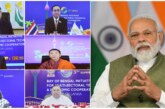The sudden death of Lady Thatcher, former British Prime Minister on 8 April this year has deprived Britain of a great dynamic leader. Margaret Hilda Thatcher, 13 October 1925 – 8 April 2013) was a British politician who served as Prime Minister of the United Kingdom from 1979 to 1990 and the Leader of the Conservative Party from 1975 to 1990.
As the longest-serving British Prime Minister of the 20th century, she was the only woman to have held the office. She was branded as the ‘Iron Lady’ by a Soviet journalist, a nickname that became associated with her uncompromising politics and leadership style. As Prime Minister, she implemented policies that have come to be known as Thatcherism.
She commenced her career as a research chemist before becoming a barrister. Elected as Member of the House of Commons in 1959, Lady Thatcher was appointed as Secretary of State for Education and Science by the then British Prime Minister Edward heath in 1970. In 1975, Thatcher defeated Heath in the Conservative Party leadership election to become Leader of the Opposition. She became the first woman to lead a major political party in the United Kingdom.

She became Prime Minister after winning the 1979 general election. From 1979 to 1990 she led Britain through a turbulent decade of change, with her signature uncompromising style encapsulated by her famous phrase: “You turn if you want to. The lady’s not for turning.”
She deregulated the financial sector, privatised many state-owned companies, and took on the then-powerful trade unions. The resulting rise in unemployment and cuts to government spending led to protests and inner-city riots that tested her early leadership. But the 1982 Falklands war cemented her popularity, and she won two more general elections before her “poll tax” proved a bridge too far.
Lady Thatcher, after becoming Prime Minister introduced a series of political and economic initiatives intended to reverse high unemployment and Britain’s struggles in the wake of the ‘Winter of Discontent’ and an ongoing recession. Her political philosophy and economic policies emphasised deregulation, especially of the financial sector, flexible labour markets, the privatisation of state-owned companies, and reducing the power and influence of trade unions. Thatcher’s popularity during her first years in office waned amid recession and high unemployment, until the 1982 Falklands War brought a resurgence of support, resulting in her re-election in 1983.
Thatcher took office during the Cold War and became closely aligned with the policies of United States President Ronald Reagan, based on their shared distrust of Communism, although she strongly opposed Reagan’s October 1983 invasion of Grenada.

Reagan had assured Thatcher that an invasion was not contemplated, and thereafter Thatcher felt she could never fully trust Reagan again. During her first year as Prime Minister she supported NATO’s decision to deploy US nuclear cruise and Pershing missiles in Western Europe and permitted the US to station more than 160 cruise missiles at RAF Greenham Common, starting on 14 November 1983 and triggering mass protests by the Campaign for Nuclear Disarmament. Lady Thatcher also played a key role in the end of the Cold War, leading the West’s embrace of reformist Soviet leader Mikhail Gorbachev.

In the last decade her engagements had become fewer, as her health gradually deteriorated. In 2008 her daughter Carol revealed dementia had affected her mother’s memory, leaving her unable to end sentences or clearly remember events, including the death of her husband, Denis. Lady Thatcher reportedly died at the Ritz Hotel in London, where she has lived since Christmas as her declining health left her in need of care she could not receive at home.British Prime Minister David Cameron said: “As our first woman prime minister, Margaret Thatcher succeeded against all the odds. She didn’t just lead our country, she saved our country, and I believe she’ll go down as the greatest British peacetime prime minister.” Mr Cameron said Lady Thatcher would be remembered for taking a country that was on its knees “and made Britain stand tall again. She was the patriot prime minister and she fought for Britain’s interests all the way.”The Thatcher Foundation tweeted: “A very sad day. Our thoughts at this time are with Baroness Thatcher’s friends and family.” Floral tributes have already started appearing at Lady Thatcher’s home in Chester Square, near Buckingham Palace in London. The BBC reported that one tribute came with the message “RIP Maggie Thatcher, the greatest British leader and a true lady.”Her death is also likely to inspire renewed debate on the ways she has changed Britain – at a time when the ruling Conservative Party is down in the polls and is battling with a party base who want to push the party back towards more Thatcherite policies.



